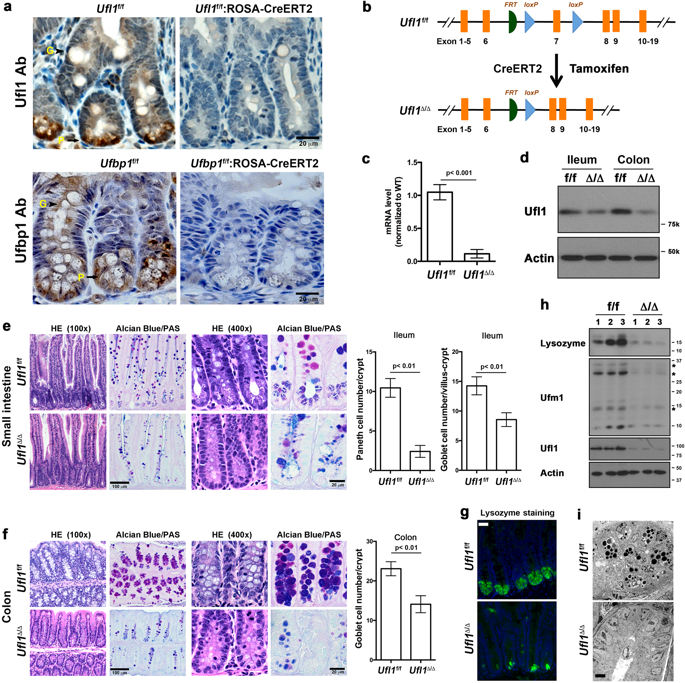Cell Discovery ( IF 33.5 ) Pub Date : 2019-01-29 , DOI: 10.1038/s41421-018-0070-x Yafei Cai , Guangxun Zhu , Siyang Liu , Zezheng Pan , Michaela Quintero , Candace J. Poole , Chunwan Lu , Huabin Zhu , Bianca Islam , Jan van Riggelen , Darren Browning , Kebin Liu , Richard Blumberg , Nagendra Singh , Honglin Li

|
Intestinal exocrine secretory cells, including Paneth and goblet cells, have a pivotal role in intestinal barrier function and mucosal immunity. Dysfunction of these cells may lead to the pathogenesis of human diseases such as inflammatory bowel disease (IBD). Therefore, identification and elucidation of key molecular mechanisms that regulate the development and function of these exocrine cells would be crucial for understanding of disease pathogenesis and discovery of new therapeutic targets. The Ufm1 conjugation system is a novel ubiquitin-like modification system that consists of Ufm1 (Ubiquitin modifier 1), Uba5 (Ufm1-activating enzyme, E1), Ufc1 (Ufm1-conjugating enzyme, E2) and poorly characterized Ufm1 E3 ligase(s). Recent mouse genetic studies have demonstrated its indispensable role in embryonic development and hematopoiesis. Yet its role in other tissues and organs remains poorly defined. In this study, we found that both Ufl1 and Ufbp1, two key components of the Ufm1 E3 ligase, were highly expressed in the intestinal exocrine cells. Ablation of either Ufl1 and Ufbp1 led to significant loss of both Paneth and goblet cells, which in turn resulted in dysbiotic microbiota and increased susceptibility to experimentally induced colitis. At the cellular and molecular levels, Ufbp1 deficiency caused elevation of endoplasmic reticulum stress and activation of the Unfolded Protein Response (UPR) and cell death program. Administration of small molecular chaperone partially prevented loss of Paneth cells caused by acute Ufbp1 deletion. Taken together, our results have provided unambiguous evidence for the crucial role of the Ufm1 E3 ligase in maintenance of intestinal homeostasis and protection from inflammatory diseases.
中文翻译:

泛素修饰因子1特异性E3连接酶在维持肠道稳态和控制肠道炎症中不可或缺的作用
肠道外分泌分泌细胞,包括Paneth和杯状细胞,在肠道屏障功能和粘膜免疫中起关键作用。这些细胞的功能障碍可能导致人类疾病的发病,例如炎症性肠病(IBD)。因此,识别和阐明调节这些外分泌细胞的发育和功能的关键分子机制对于理解疾病的发病机理和发现新的治疗靶点至关重要。Ufm1偶联系统是一种新型的泛素样修饰系统,它由Ufm1(泛素修饰剂1),Uba5(Ufm1活化酶,E1),Ufc1(Ufm1偶联酶,E2)和特性欠佳的Ufm1 E3连接酶组成。 。最近的小鼠遗传学研究表明,它在胚胎发育和造血过程中起着不可或缺的作用。然而,其在其他组织和器官中的作用仍知之甚少。在这项研究中,我们发现Ufm1 E3连接酶的两个关键组成部分Ufl1和Ufbp1在肠道外分泌细胞中都高度表达。Ufl1和Ufbp1的切除均导致Paneth和杯状细胞的大量损失,进而导致营养不良的微生物群,并增加了对实验性结肠炎的易感性。在细胞和分子水平上,Ufbp1缺乏引起内质网应激的升高以及未折叠蛋白应答(UPR)和细胞死亡程序的激活。小分子伴侣的管理部分防止了急性Ufbp1缺失引起的Paneth细胞丢失。综上所述,我们的结果为Ufm1 E3连接酶在维持肠道动态平衡和预防炎症性疾病中的关键作用提供了明确的证据。


























 京公网安备 11010802027423号
京公网安备 11010802027423号